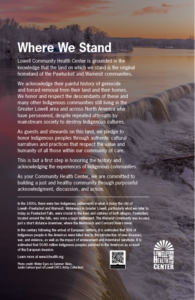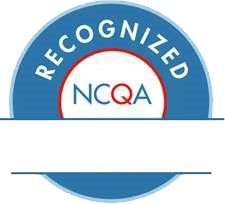In October 2022 we installed a piece at each of our entryways acknowledging that the land our health center sits on was once home to two thriving indigenous settlements. As the piece states, this is but a first step. We look forward to working on other meaningful ways to honor Indigenous peoples as part of our mission of delivering culturally rooted care to all those we serve.
Where We Stand

Lowell Community Health Center is grounded in the knowledge that the land on which we stand is the original homeland of the Pawtucket and Wamesit communities.
We acknowledge their painful history of genocide and forced removal from their lands and their homes. We honor and respect the descendants of these and many other Indigenous communities still living in the Greater Lowell area and across North America who have persevered, despite repeated attempts by mainstream society to destroy Indigenous cultures.
As guests and stewards on this land, we pledge to honor Indigenous peoples through authentic cultural narratives and practices that respect and value the humanity of all those within our community of care.
This is but a first step in honoring the history and acknowledging the experiences of Indigenous communities.
As your Community Health Center, we are committed to building a just and healthy community through purposeful acknowledgement, discussion, and action.
In the 1600s, there were two Indigenous settlements in what is today the City of Lowell – Pawtucket and Wamesit. Waterways in Greater Lowell, particularly what we refer to today as Pawtucket Falls, were crucial to the lives and cultures of both villages. Pawtucket, located around the falls, was once a large settlement. The Wamesit community was located just a short distance downriver, where the Merrimack and Concord Rivers meet.
In the century following the arrival of European settlers, it is estimated that 90% of Indigenous people in the Americas were killed due to the introduction of new diseases, war, and violence, as well as the impact of enslavement and indentured servitude. It is estimated that 50-80 million Indigenous peoples perished in the Americas as a result of the European invasion.
Acknowledgements
We are incredibly grateful to Professors Robert Forrant and Christoph Strobel of UMass Lowell, as well as Tom Libby, Chief of the Greater Lowell Indian Cultural Organization, for offering their time and expertise on this project.
Photo credit: Winter Eyes on Summer Skies, Justin Carlson (part of Lowell CHC’s ArtUp collection)



